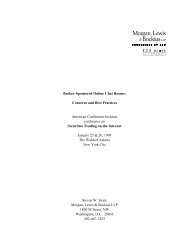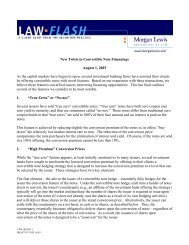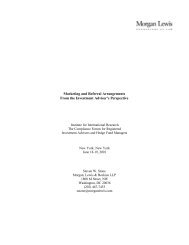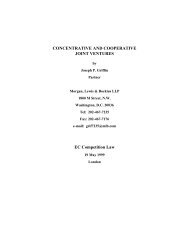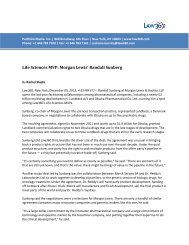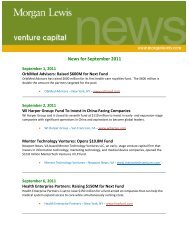Coming to Terms, Human Resource Executive, September 2005
Coming to Terms, Human Resource Executive, September 2005
Coming to Terms, Human Resource Executive, September 2005
Create successful ePaper yourself
Turn your PDF publications into a flip-book with our unique Google optimized e-Paper software.
who <strong>to</strong> involve at each stage of the<br />
outsourcing process and how <strong>to</strong><br />
avoid some of the more common and<br />
fr ustrating traps.<br />
Melby, co-author of two seminal<br />
books on outsourcing, recently spoke<br />
<strong>to</strong> HRE about some of the common<br />
mistakes companies make when it<br />
comes <strong>to</strong> formulating and executing an<br />
HR BPO strategy.<br />
When it comes <strong>to</strong> negotiating an HR<br />
BPO agreement, what do you see as the<br />
biggest mistakes employers typically<br />
make?<br />
I think the biggest mistake is not<br />
investing enough time up front, prior <strong>to</strong><br />
contract negotiations.<br />
It’s impor tant <strong>to</strong> identify what the<br />
success criteria are going <strong>to</strong> be for<br />
the deal up front, and then use that<br />
as a checkpoint at each of the phases<br />
of the transaction. It’s impor tant for<br />
people <strong>to</strong> be reminded of the success<br />
criteria for the deal. Cutting costs<br />
is one example. Or it could be that<br />
you wanted better ser vice. Or you<br />
wanted a standardized solution across<br />
your whole company. Or it could be<br />
that you wanted <strong>to</strong> globalize your HR<br />
platforms.<br />
If you don’t identify what the<br />
success criteria are, and what you<br />
really want <strong>to</strong> get out of the deal on<br />
the back end, people are going <strong>to</strong><br />
star t second-guessing you. You want<br />
<strong>to</strong> make sure that you can point <strong>to</strong><br />
what the success criteria are so you<br />
can say, “We actually are meeting<br />
what we set out <strong>to</strong> meet.”<br />
What’s the typical timetable for<br />
negotiating this kind of agreement?<br />
It depends on the size and scope of<br />
the deal. Outsourcing one function,<br />
such as benefits administration,<br />
will typically have a shor ter time<br />
line than a full-scale HRO, which<br />
encompasses most, if not all, of your<br />
HRO processes. Generally, I would<br />
say it could be anywhere between<br />
90 days and nine months. It’s a ver y<br />
broad range, depending on a bunch of<br />
fac<strong>to</strong>rs.<br />
Another [variable] is if you’ve<br />
ever outsourced before. If you’re re-<br />
sourcing a function that’s already been<br />
outsourced, you’re going <strong>to</strong> at least<br />
have an educated internal group when<br />
you go <strong>to</strong> the next vendor.<br />
It’s impor tant <strong>to</strong> look at what you<br />
have in front of you with respect <strong>to</strong><br />
scope and the number of vendors you<br />
want <strong>to</strong> talk <strong>to</strong>, and map out the time<br />
line. Then work backwards from the<br />
date that you need <strong>to</strong> have it done by,<br />
and star t thinking about whether or<br />
not you can do it in that time frame.<br />
Who typically are the players involved<br />
in the contract negotiation process<br />
and what are their roles? And do you<br />
feel the right people are typically being<br />
included?<br />
From a legal perspective, it’s<br />
incredibly impor tant <strong>to</strong> identify and<br />
get the right team <strong>to</strong>gether early on<br />
in the process, during the strategy<br />
phase.<br />
To the extent that you can bring in<br />
your legal team as early in the process<br />
as possible, that’s a great thing,<br />
because that way, the legal team can<br />
help guide you through due diligence<br />
and identify any big pitfalls prior <strong>to</strong><br />
actually going on <strong>to</strong> the [request for<br />
proposal] stage.<br />
For sure, you’re going <strong>to</strong> need<br />
your HR team and, if there are any<br />
employee transfer issues—people who<br />
specialize in employee transfers within<br />
your organization. You’re going <strong>to</strong><br />
need people from IT; and most likely,<br />
someone from risk management and<br />
insurance, if those people exist within<br />
your company.<br />
Many companies have privacy<br />
officers, and those people need <strong>to</strong> be<br />
involved. And if you’re a regulated<br />
industr y, [involve] your compliance<br />
officer. And let’s not forget someone<br />
from tax.<br />
Are there certain individuals who<br />
are being left out of the process who<br />
shouldn’t be?<br />
Typically, you have the HR manager<br />
being brought in, and you have a<br />
technical person being brought in. But<br />
the other players, who may be viewed<br />
as more peripheral, are not brought in<br />
until later in the process. And that’s<br />
when it gets a little dangerous when<br />
you’re tr ying <strong>to</strong> get people up <strong>to</strong> speed,<br />
and you’re already four months in<strong>to</strong><br />
the process. I see tax being left out a<br />
lot. I see privacy and risk management<br />
people being brought in <strong>to</strong>o late.<br />
So the best strategy is <strong>to</strong> bring them in<br />
early in the process?<br />
I think it’s really important <strong>to</strong> form<br />
your team and identify all the players<br />
on your team as early as you can, even<br />
if they move in and out of the process.<br />
As soon as you identify that you want<br />
<strong>to</strong> outsource, you need <strong>to</strong> get these key<br />
players on board.<br />
You also need <strong>to</strong> identify a project<br />
manager who will be there start <strong>to</strong><br />
finish. Not just someone part-time, but<br />
someone who will be focusing on this<br />
full-time.<br />
What kind of up-front work should an<br />
HR leader be doing before the contract<br />
negotiations get started?<br />
As mentioned earlier, one of the<br />
key things is <strong>to</strong> identify the success<br />
criteria. What does the company need<br />
<strong>to</strong> see in order for this deal <strong>to</strong> be<br />
successful?<br />
One of the pitfalls I see is that a<br />
company goes in and says, “OK, we<br />
want <strong>to</strong> outsource our HR,” but then it<br />
doesn’t really know what the scope of<br />
its own HR is when it goes out <strong>to</strong> bid.<br />
So it’s really important—and it’s going<br />
<strong>to</strong> save time on the back end—if the<br />
client can go through and scope out<br />
what they do <strong>to</strong>day.<br />
It’s ver y dangerous <strong>to</strong> say <strong>to</strong> a<br />
vendor, “OK, bid on something,” when<br />
you don’t even know what they’re<br />
bidding on. That’s why it’s important<br />
<strong>to</strong> sit down … and map out the scope of<br />
what you do <strong>to</strong>day.<br />
Sure, that ef for t requires a bit<br />
more investment up front, but it<br />
really pays of f on the back end,<br />
because it’s going <strong>to</strong> help you<br />
[produce] the ser vice document that<br />
gets attached <strong>to</strong> the contract. It’s<br />
going <strong>to</strong> help you compare the bids<br />
ef fectively.<br />
Are there certain kinds of performance<br />
measures that should be incorporated in<strong>to</strong><br />
the agreement?




